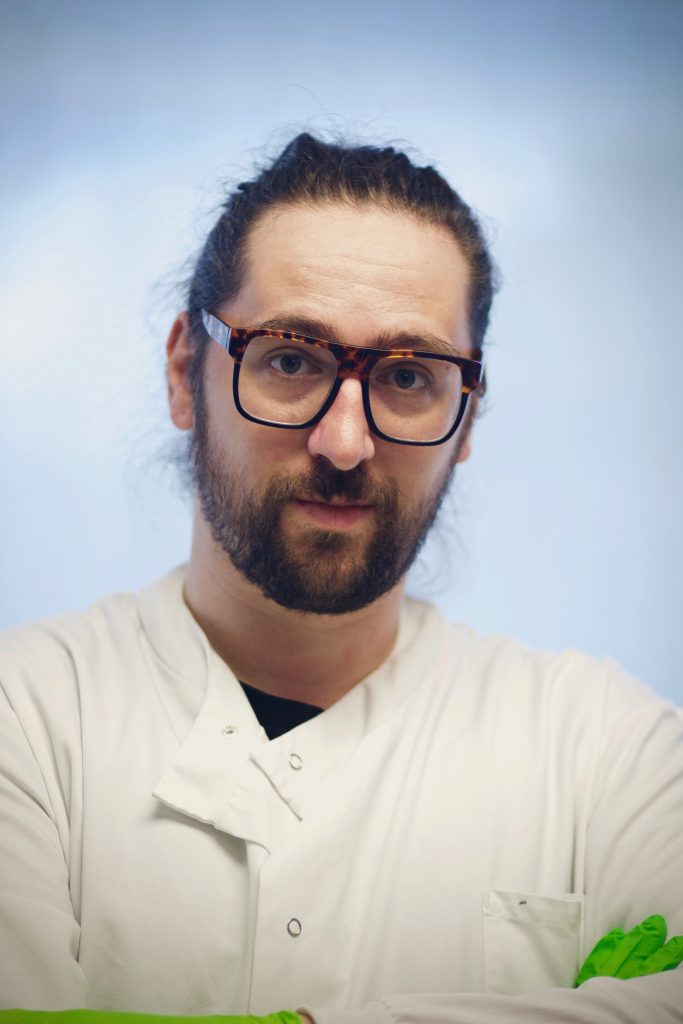
Profile: Dr Luke Roberts
For our first ‘Becker Profile’ we spoke to Dr Luke Roberts, Research Fellow in the Lord Lab, to find out more about his research and what makes Manchester such a fantastic place for immunology.
Please introduce yourself and tell us about your background in research
I grew up in Cornwall and after college moved to study at the University of Bristol where I gained my BSc in Zoology. While there, I became fascinated by parasites (worms in particular). As a result, I stayed in Bristol to do a research MSc in veterinary parasitology and ecology. Following this I joined Imperial College London where I earnt my PhD in the Molecular Basis of Infection and Immunity, funded by The Wellcome Trust. My interest in worms led me to take up my PhD project in the lab of Murray Selkirk where I investigated how the non-neuronal cholinergic signaling system impacts the development of the type 2 immune response associated with parasitic worm infection and inflammatory airway diseases such as asthma. One of the discoveries I made during this time was that Group 2 Innate Lymphoid Cells (ILC2s) synthesise and release the neurotransmitter acetylcholine following their activation and that this plays an important role in facilitating optimal type 2 immunity in response to worm infection – marking the beginning of my interests in innate lymphocytes, which now forms a significant part of my current and ongoing research focus.
After my PhD, I joined the lab of Graham Lord (at the time, based at King’s College London) as a post-doc and began exploring how the functions of innate and adaptive lymphocytes are regulated by microRNAs – work which I have now moved up to Manchester to continue. In addition, I work on other exciting projects involving regulatory T cells in the context of Inflammatory Bowel Disease and the biology of the transcription factor T-BET, which form important focal points in the research interests of the Lord Lab.
What excites you about your research right now?
I’m currently developing a project examining how Group 3 innate lymphoid cells (ILC3s) regulate their functions in the intestine, so naturally I’ve been collaborating with Manchester’s resident ILC3 expert, Matt Hepworth (and his research group) a great deal since moving here. I’m grateful to have been welcomed as an ‘honorary member’ of the Hepworth Lab and it’s been great to learn about and get involved in the exciting projects they are running. Additionally, as my personal research interests have been expanding into the field of cardiovascular disease and cardioimmunology in recent years, I am excited by the prospect of developing this work further here at Manchester.
What are your career goals?
In the short term, my goals are focused on facilitating the success of the projects I am currently leading and collaborating on. Like many of my post-doctoral peers, in the longer term, I am pursuing the steps I need to take to make the transition from my current role, into that of an independent researcher. The dream is to lead an internationally recognised research group that contributes high-quality science to my chosen field. I’ve been lucky enough to have some great mentors in my career so far, so I also hope that I can serve that role for others in the future too.
What’s great about immunology at Manchester?
So far, my favourite things about how Manchester does immunology have to be the extremely collaborative nature of the work environment, as well as the huge wealth of experience and knowledge collectively provided by the researchers based here. The post-doc and PhD student community has also been incredibly welcoming, making moving here and leaving behind friends in London easier to deal with!
What do you enjoy doing in your free time?
Since moving here, most of my free time has been spent getting to know the city and discovering what it has to offer. I’ve particularly enjoyed getting to know areas around South Manchester including Burnage and Didsbury, near to where I now live. My partner and I enjoy thrifting and upcycling, so we will often be found rummaging through charity shops and car boot sales on the weekend, looking for discarded treasure.
Follow Luke on Twitter: @Lukuscyte
Publications: PubMed
Photo: Brian Chan






0 Comments